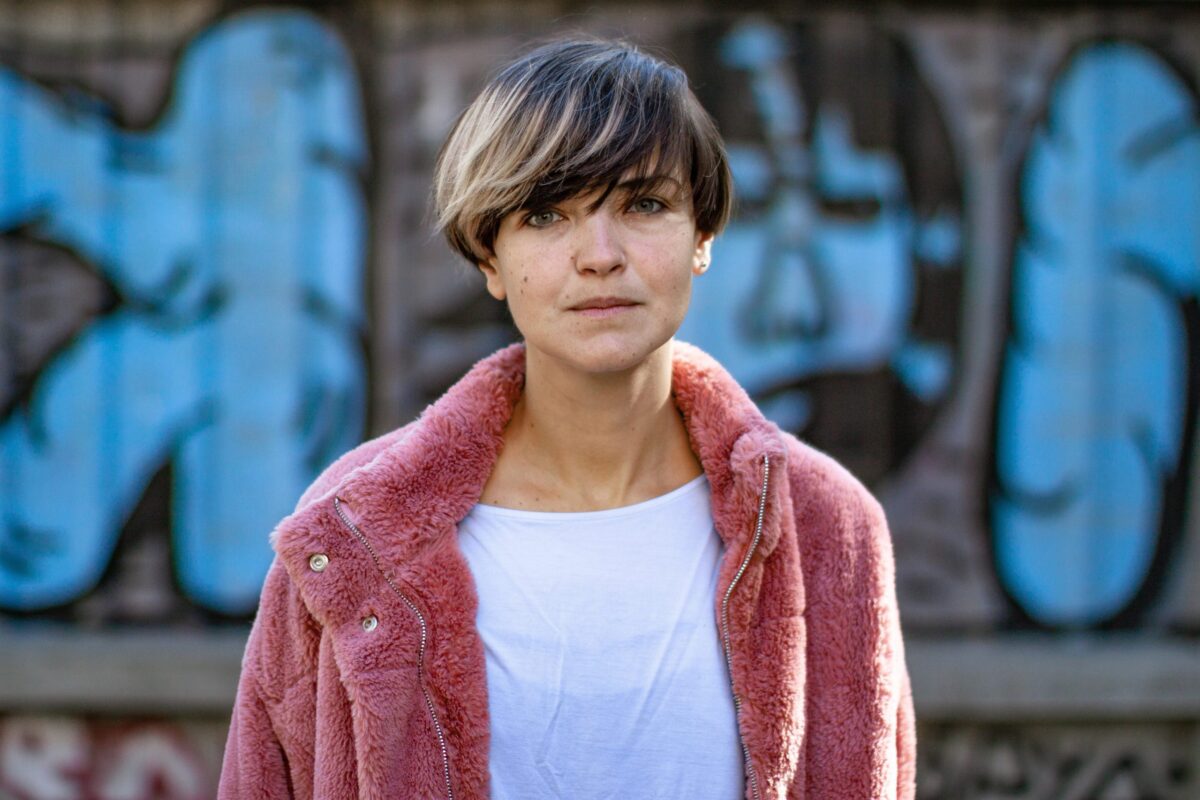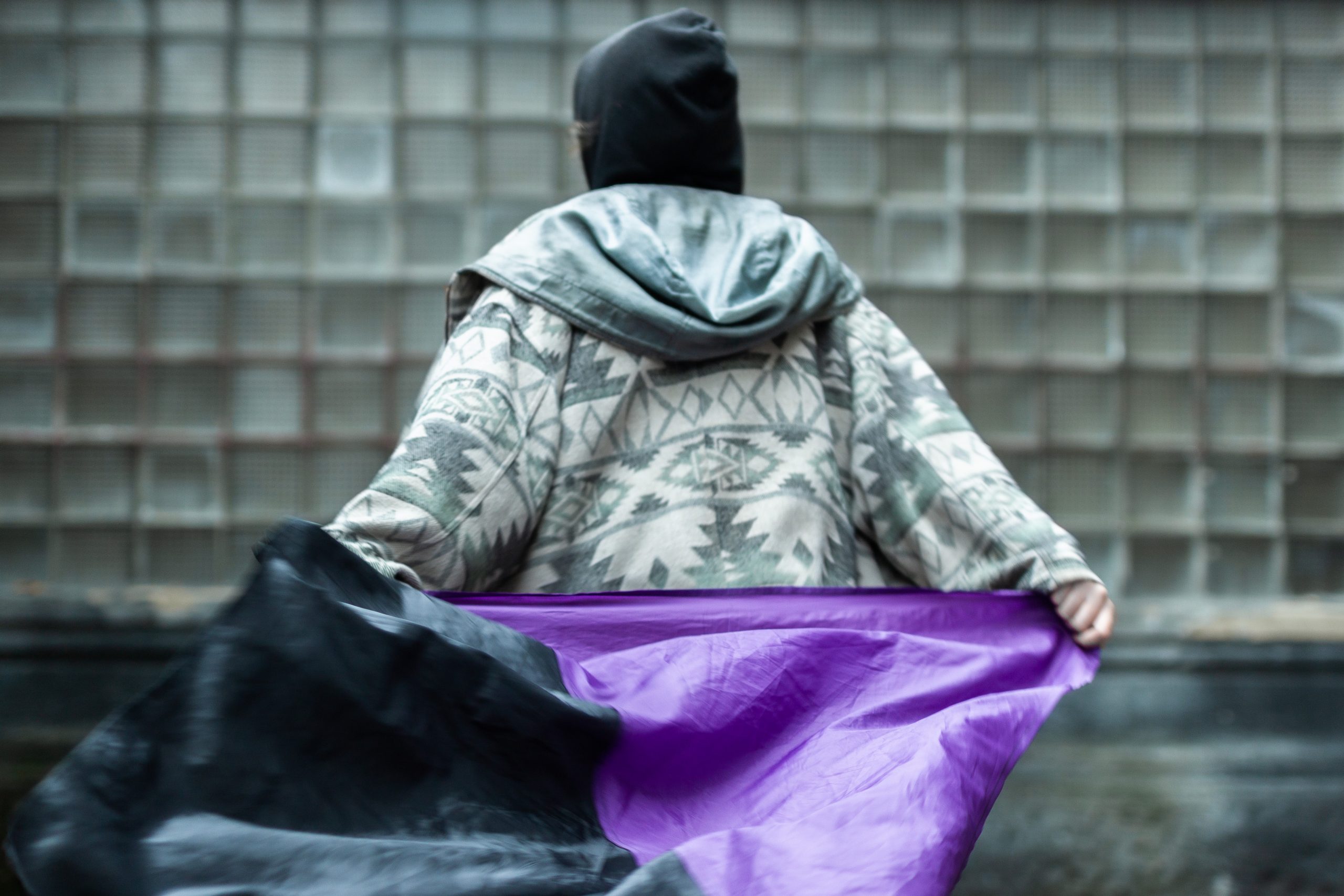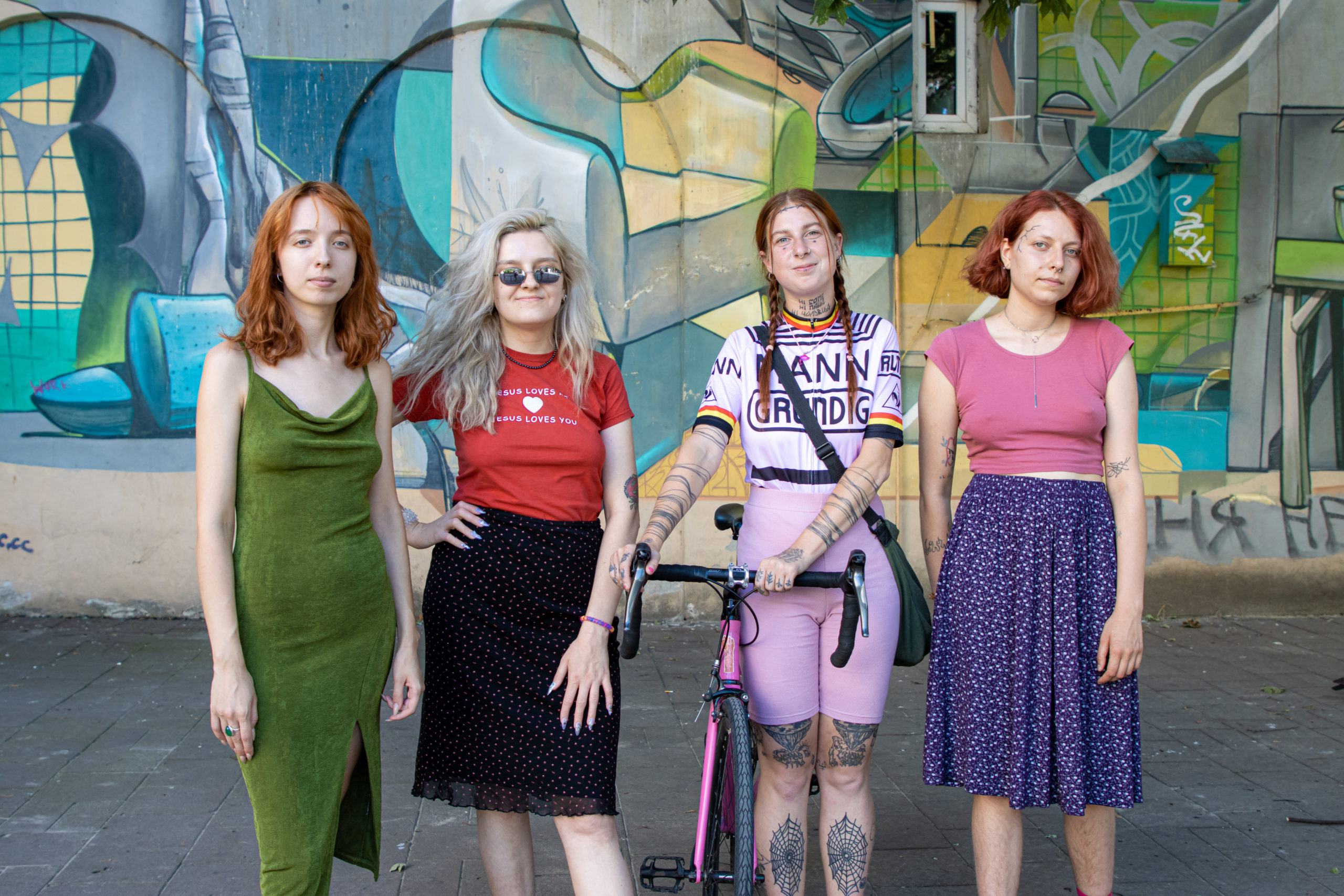Olesia Onykiienko (NFNR)
On women’s electronic music scene and exploration of the sound
30 October 2019
Editor: Bozhena Makovska
Translator: Maryna Isaieva
Photographer: Michael Tulsky
For someone I’m not radical enough to be a feminist, others consider me to be a feminist as I’m promoting women’s interests. I’m not a civic activist; my key area is music. I’m not sure I do enough to call myself like that.
I wish for a long time to create some female musical initiative, so Sasha Dolgiy invited me to lead the project Womens Sound in the Institute of Sound. This is a cultural and educational public organization created to support musicians. Institute has an interest in developing modern electronic music, opening new schools where beginners could study and practice for free.
Together with Sasha, Karina Lazaruk and other musicians, we arrange performances in different Ukraine cities, organize parties and give lectures. Sometimes we are looking for local female performers and invite them to play with us. The duration of sets varies the same as the experience of participants. If the concert is at night, we make the free donation entry fee, but mostly it’s free. One of the main goals of such events is to find each other and form a community. Women musicians in Ukraine are quite isolated, and some are afraid to begin. For example, after the lecture in Severodonetsk, few girls came to us. They told us they would like to play electronic music and develop in this area. They hadn’t seen any sense in it before, as the music scene is male-dominated. As a result, we are not only exchanging information but also providing psychological support. It’s an important part of my guidance.

“Womens Sound is the exploration for ourselves and work in progress.“
Some people demand from us to take a clearer position, be more radical although I don’t think we should. For me, Womens Sound is the exploration for ourselves and work in progress including the search of the language and definition of the problems which cause a small presence of women in line-ups. At the moment we are quite idealistic and open-minded, our goal is to increase the presence of women, not to separate them from men. Surely there is an issue of providing a safe space, we are ready to work with guys but we are striving to avoid psychological violence and dominance from their side. Others say: “By calling yourselves Womens Sound you humiliate and disvalue female musicians”, however Womens Sound is the sound created by women. Even if we call it female music, I don’t see any humiliation. Why everything female is perceived as less valuable?

I was born in Kyiv but went to Lviv to become a conductor. After the Orange Revolution, I had so much energy, and I hoped to immerse myself there in the culture environment. But it didn’t happen. I couldn’t find associates, and there were no places to perform with sets in Lviv. I realised I didn’t want to stay there and wanted to come back home. Being in Kyiv, I decided to enter the National University of culture and arts, but at the last moment, the exam was relocated to another building for unknown reasons. A few other applicants and I got late while searching for the right building. Finally, the examiner let in only three boys who came with all the girls, and we were left outside.
Music education in Ukraine is quite conservative. In Lviv, we were taught to write by ear and afterwards were corrected. No one teaches avant-garde music of the XXth century, and nobody understands it at all; everything ends with Rakhmaninov and Debussy. However, students have a great request for that: together with the Institute of sound, we gave lectures in the pedagogical school and gathered a full hall. Despite all the difficulties, I continued playing music mostly because of my idealism, stubbornness, and naivety. Also, I felt that in music, I can express and understand much more than people in my surroundings. This feeling held me tight.
“It was interesting to process and create our own imaginative worlds.“
I composed before the University, but my first job as a composer I got in the theatre when someone recommended me. After that, the theatre director moved to another one where there was no recording studio, so I’ve learnt how to record it by myself. I was very encouraged by the possibility to process and explore the sound myself; many opportunities opened up, I felt very relieved. As a child, I did not have access to music. I do not come from an intellectual family. Then there was no Internet for a long time, and I listened to avant-garde records on disks. I have an academic background, so I was not acknowledged with electronic music until I started recording it.
I started performing in 2014 in Ether. It was there where I found a community that I had lacked in Lviv. My friends and I started doing experimental hearings at the Mala Gallery. We recorded the sounds of different areas of the city, Podil, the Botanical Garden, I recorded the noise of trams, and Maxim Werner — the current in the wires. It was interesting to process and create our own imaginative worlds. The events were in great demand. Later, in the Plivka art space, we continued the experiment: we recorded different water states, the noise of polyethylene, glass, and tearing of fabrics. Our goal was to attract “non-musicians” to experiment, record sounds, perform as they can. I’d like to return to this practice. I am interested in exploring society’s involvement in musical activity, interacting with sound, listening, overcoming the concept of “music for professional musicians.” My relatives told me: “You are not Chopin,” and I would like more people to stop so dictatorially restricting others and themselves.

“Working with artists, especially regarding social issues, helps me better understand my cultural process role.“
I played with different musicians. Not everyone comes out to feel each other, let their inner artists open up, and play another way. With Ira Novikova (insomnia taxxi) we get something completely different from the fact that we play separately. This is probably best described as avant-garde techno. With Ira, we also play with the Swedes Skallahavet and Birds ov Paradise.
In 2018, together with Katya Berlova, we participated in the residency of the 86 film festival in Slavutich. It was a project-intervention in the urban environment: we went down to the sewer and arranged a rave underground. Most of the time, we spent negotiating with public utilities to get permission. We did not announce the performance itself, and festival visitors simply followed the hatches’ sound and light. Similar invasion of city space Katya and I and our project Deus ex machina carried out in Dnipro: we explored the subway, which few people use. We decided to place the rave at the factory passage. I played industrial techno at 7 in the morning, and at the same time, we filmed young people on the subway who were coming back home. The works were presented in the Art Svit gallery in Dnipro.
The last collaboration, the one very memorable for me, took place last year at a residence near Berlin. We worked with a step dancer: she danced on different surfaces, for example, a cornfield with leftover cut stalks. I was looking for locations and recorded sound. In addition, we presented a video project and made a joint presentation. Working with artists, especially regarding social issues, helps me better understand my cultural process role. Musicians are an outlet for society, a portal to an interesting world. Like science fiction writers, we form an alternative reality and a different worldview: non-conformal and very freedom-loving. This skill should be trained with every performance, in every composition, in any creative act.

I see absolutely groundless doubts among original, powerful musicians, insecurity, torment, intense tension caused by psychological barriers and lack of a familiar environment. Probably, my experience of an absolute lack of support from relatives, and almost all my friends, when it was essential, the state of despair because of this, helps me to understand these girls better. I also face difficulties in the professional field as a theatre composer and musician. For example, it is especially tough with sound engineers: often, I need to take a stand, prove professionalism, or simply seek technical personnel to fulfil my decisions if they are men. I feel sick of an indulgent attitude everywhere, especially in state institutions and among doctors. For me, this is a self-identification problem that I want to work on. Back in the day, the comparison of my creative achievements with men’s ones was flattering me. Sadly, it pleased me then.
“I feel sick of an indulgent attitude everywhere.“
My piano teacher at the school did a great job on my self-confidence, self-presentation and complexes. I also was teaching music to children for a long time, and I know that you need to be a psychologist too. Practical things, such as technical assistance in the first performance, really help, but, in general, attention to your creativity is significant: response, request for performances, recordings, even social media coverage. I also often believe that female musicians do not trust their inner intuition or cannot find something of their own. They copy what other musicians do and can create a high-quality product but completely deprived of personality. I would advise those who are just starting to work with sound to focus on their experience and state, personal aesthetics, try to look for their language. Technical skills can always be developed.

“Self-organization is almost the only opportunity to speak actively.“
Even in big cities, musicians have to do it themselves: organize performances, parties, and their own communities. We work on this problem at the Sound Institute and Womens Sound. We seek funding to develop musical communities in the regions, educational events, and communications with electronic festivals in other cities. We publish Womens Sound live on Mixcloud. People can also send us tracks — you can find contacts on our Facebook. Shortly, we plan to launch a podcast and talk about female artists, invite them to the studio and discuss the challenges women face in the music sphere. At the end of October, we will present the project in Berlin, in Das Kapital. Together with Nastya Noisynth, we will perform in Prague with the Synth Library Prague – ZVUK community on November 27th. To some joint events we are invited, like in Berlin, we are still investing our money to visit friends there. There are many proposals, but now we need support from cultural institutions; the amount of work is gigantic. We want to continue working with Konstmusiksystrar and with other women’s communities. If we can get funding, we will make a festival — an educational forum with electronic music workshops, collaborations, and a residence.
When we first started doing the project, I did not think of how my life would change. Over the past year, I have made a lot of acquaintances. I’ve got more opportunities to perform, to do interesting events. And the existence of a stable active community only strengthens this, as does the demand for electronics, avant-garde music, experiments with sound. All of that makes me very encouraged as an artist.



